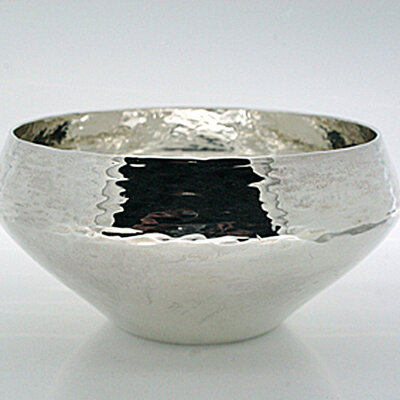Abigail Brown
Abigail Brown has been producing contemporary designs in silverware since graduating from Loughborough University School of Art & Design in 2001. Her work has been exhibited internationally and is widely collected.
Ref: SSS31575
On this exciting, ideas-led course, express your creativity by working on individual projects, ranging from a small bowl or vase to large, experimental jewellery. If you are a beginner, learn basic techniques. For the more experienced, develop your skills, creating and finishing forms in sheet metal, using techniques such as raising, planishing, soldering and press forming.
Learn methods for creating three-dimensional forms from sheets of metal using fold forming, raising, planishing, soldering and press forming. Beginners will be introduced to basic techniques, including forming, soldering, annealing and texturing, and more complex techniques such as raising. The more experienced can continue to develop their skills according to their needs.
Your design ideas are discussed on a one-to-one basis, and demonstrations and individual practical assistance will enable your projects to progress successfully. The level of experience and complexity of ideas will affect what you can achieve in the time, but you can make a small bowl or vase, a simple box, or you can experiment with the techniques to create large jewellery items, depending on your preference. The course approach is strongly ideas-led and you are encouraged to make simple drawings or paper models of your ideas to communicate what you wish to make.
You can explore your ideas and a range of silversmithing techniques on this course, and you will receive instruction and support in a friendly and creative atmosphere. The techniques are taught through practical demonstrations, with the emphasis on encouraging you to have a go and to develop your own ideas.
Please note: The tutor likes to have a chat with students personally 3 – 4 weeks before the course starts. This gives her the opportunity to discuss your project and advise about buying materials. This conversation on the phone is an essential part of the course and preparation. Your email and phone number will be passed to the tutor.
Summer School highlights:
The Summer School week is an immersive learning experience with more time to develop your creativity and embrace opportunities for creative development beyond your chosen course. A detailed timetable for your Summer School week will be given to you on arrival. This will include:
• Short inspirational talks by tutors and displays of their work
• A short creative experience session in another discipline/media or course
• An optional evening at the Chichester Festival Theatre (if pre-booked)
• An optional lunchtime tour of West Dean Gardens, the historic rooms at West Dean College, or West Dean Tapestry Studio
• A celebration dinner on the last evening themed on Impressionism, celebrating the 150th anniversary of the first Impressionist exhibition held in Paris in 1874. Feel free to respond to the theme if you wish.
• Informal end-of-course group reviews and displays of students' work in studios
As evening events are planned as part of the Summer School week, dinner is included in the course fee to enable all students, including non-residents, to participate fully.
Timetable for Summer Schools
Several evening events are planned throughout the week, a detailed timetable for the summer schools will be given to you on arrival.
Arrival Day
Residential students to arrive from 4pm, non-residential students to arrive by 6.45pm.
6.45pm: Welcome, followed by dinner (included).
8 - 9pm: First teaching session, attendance is essential.
Daily timetable
Classes 9.15 - 5pm, lunch is included.
From 6.30pm: Dinner (included).
Evening working - students may have access to workshops until 9pm, but only with their tutor's permission and provided any health and safety guidelines are observed.
Last day
Classes 9.15am - 3pm, lunch is included.
Residential students should vacate their rooms by 10am please.

Abigail Brown has been producing contemporary designs in silverware since graduating from Loughborough University School of Art & Design in 2001. Her work has been exhibited internationally and is widely collected.
Residential option available. Find out accommodation costs and how to book here.

Places available - Book now

Places available - Book now

Places available - Book now

Our Foundation Degree in Metalwork will enhance your employment prospects, give you the skills to set up as a self-employed craftsperson or allow you to continue to higher education. Encompassing both silversmithing and blacksmithing, you will learn practical skills, material properties, placing your work in a broader context and historic metalworking techniques. Find out more